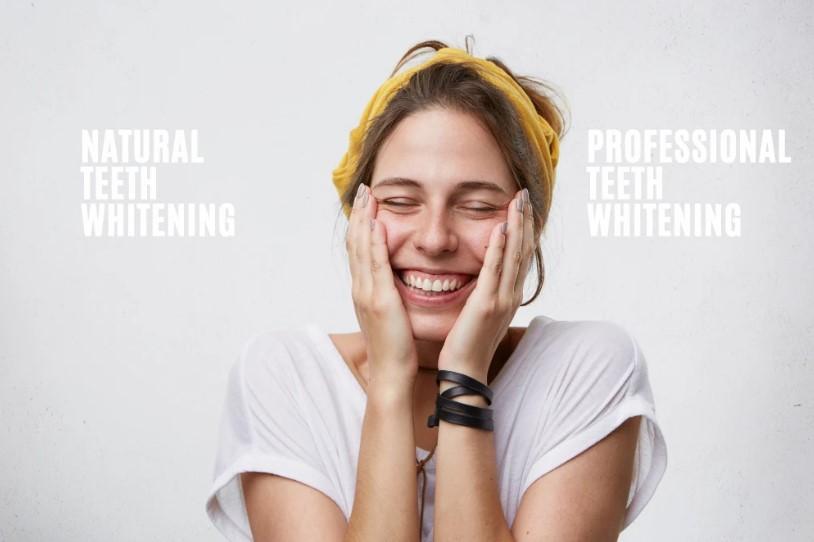Natural vs. Professional Teeth Whitening-Which is Right for You?
Whitening of the teeth has become one of the most famous solutions for making one's teeth whiter and shinier, but people are usually caught up in a debate: natural whitening techniques versus professional treatments. Are "natural" remedies really effective? How do they work compared to professional ones? This guide compares the differences and dispels common myths that will help you determine which option best fits your oral health goals.
Understanding Natural Methods of Teeth Whitening
Natural teeth whitening involves using household items or organic remedies to remove stains. Some popular methods include:
Activated Charcoal
Claimed to absorb stains, activated charcoal is often used in powder or toothpaste form. However, studies suggest that its abrasive nature can wear down enamel over time, leading to increased sensitivity and potential damage.
Baking Soda
Baking soda is commonly suggested due to its mild abrasiveness and alkalinity that can help scrub surface stains. While moderately effective, it doesn't penetrate deeper layers of enamel.
Oil Pulling
This ancient Ayurvedic practice involves swishing coconut or sesame oil in the mouth to "pull" out toxins. While it may improve oral hygiene, there's no substantial evidence supporting its effectiveness for teeth whitening.
Professional Teeth Whitening: What Sets It Apart?
Professional teeth whitening is a procedure supervised by dentists; it involves scientifically formulated active agents to produce faster and more reliable results. The main two methods include:
In-Office Whitening Treatments
The dentists use high-concentration hydrogen peroxide or carbamide peroxide gels with light activation to break up stains. Various studies show that teeth can be improved up to 3-8 shades in just one session.
Take-Home Whitening Kits
These kits are tailor-made by dentists and employ professional-grade whitening agents. While slower than in-office whitening treatments, they work faster than over-the-counter options.
Cost, Efficacy, and Safety: A Comparison
| Feature | Natural Remedies | Professional Treatments |
| Cost | VERY LOW; OFTEN FREE | HIGH; RANGES FROM €150 TO €700+ |
| Efficacy | only surface stains | DEEP AND SURFACE STAINS |
| Safety | UNREGULATED; RISK TO THE ENAMEL | DENTIST-SUPERVISED; SAFETY GUARANTEED |
| Longevity | TEMPORARY; NEEDS TO BE REPEATED | FIXED; CAN LAST FOR YEARS |
While these methods might seem cost-effective, most of them cannot guarantee predictable or safe results. Professional whitening has always worked out under the observation of proficient practitioners.
Hidden Dangers of Do-It-Yourself Whitening
Many popular natural remedies have hidden dangers associated with their use:
Enamel Damage: The abrasive nature of baking soda or charcoal can wear away the enamel, making teeth more susceptible to cavities and sensitivity.
Uneven Whitening: Homemade remedies may not have any precision in whitening, usually causing uneven stains on the teeth. These remedies, being highly acidic-for example, lemon juice-will only inflame the gums and exacerbate sensitivity. Instead, try taking a professional approach. It works not just to whiten your teeth but also to ensure the health of your enamel and gums.
Unexpected Benefits of Professional Teeth Whitening
Apart from cosmetic advantages, professional whitening has some surprising benefits:
Personalized Care
Dentists evaluate the condition of your teeth and recommend a treatment that best suits your needs while avoiding possible risks such as sensitivity.
Long-Term Value
Although more costly at the outset, professional whitening can last for as long as 3 years, thus avoiding constant touch-ups.
Increased Self-Esteem
A whiter smile will go a long way in boosting your self-esteem, both personally and professionally.
Improved Oral Health Awareness
Whitening treatments are often performed together with dental check-ups, so other oral health problems are also detected in their early stages.
Professional Opinion: What Do Studies Say?
Clinical research supports the superiority of professional treatments:
A 2021 study in the Journal of Clinical Dentistry found that professional whitening achieved 94% patient satisfaction, compared to just 43% for at-home remedies.
Another report revealed that patients using professional-grade peroxide gels experienced 50% less sensitivity than those using generic over-the-counter products.
Making the Right Choice for Your Smile
Choosing between natural remedies and professional treatments depends on your priorities:
Budget-Conscious Individuals: Natural methods can be a temporary fix but should be approached cautiously to avoid long-term damage.
Results-Oriented Patients: Professional whitening offers unparalleled safety, efficacy, and longevity.
So if you are looking for a brighter and safer alternative, consider consulting a professional dentist for teeth whitening. Need a brighter smile? Try professional teeth whitening now.



